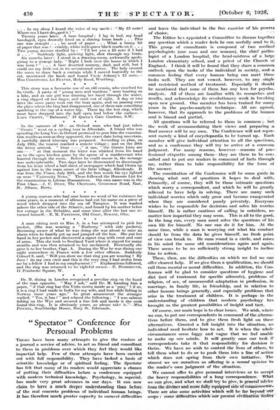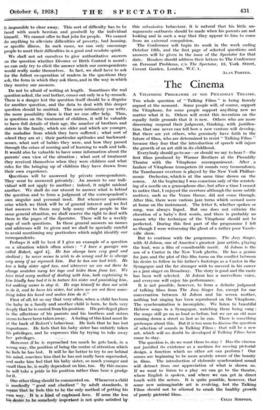" Spectator " Conference for Personal Problems
THERE have been many attempts to give the readers of a journal a service of advice, to act as friend and consultant to them in problems over which they feel they, would like impartial help. Few of these attempts have been carried out with full responsibility. They have lacked a basis of scientific knowledge or of spiritual feeling. The Spectator has felt that many of its readers would appreciate a chance of putting their difficulties- before a conference equipped with modern technical knowledge. Psychology, in 'especial, has made very- great advances in our days. - It can now claim to have a much deeper understanding than helm - of the real concrete problems of individual human, beings. It has therefore much greater capacity to unravel difficulties
and leave the individual in the free exercise 'of his powers of choice. . . .
The Editor he s appointed a Committee to discuss together any question which a reader feels he can usefully -send 'to it: This group of consultants is composed of two medical
psychologists (one man and one woman), the chief patho- logist of a London hospital, the head-mistress of a large
London elementary school, and a priest of the - Church of England.. I think it will be found that they share a.comnioil outlook upon the tasks of the individual in society, and!=a common feeling that every human being can meet those tasks well.- They are not vowed,. however, to any :single and restricted method of treatment. 'Especially - it should
be mentioned that none .of them has any love for psyche- analysis. All of them are familiar with its researches and results, and acknowledge its revolutionary work in breaking
open .new ground. One member has been trained for many years in the psycho-analytic technique. All are agreed, however, that its approach to the problems of the human' soul is biased and partial., - All questions will. be referred to them in common butt the. work, of accommodating their views and preparing final answer will be my own. The Conference will not .repre- sent merely, a kind. of encyclopaedia to be turned up. Each member will give individual attention to all the- questions, and as a conference they will try to arrive at a common-
judgment. For.- many _reasons, however—reasons of- profi, fessional etiquette among them—they are there to be - coa-
suited and to put our readers in command of- facts through me, rather than to take responsibility for the form of the answer.
The constitution of the Conference will be- some guide .in showing what sort of questions it hopes to - deal -witb. Primarily, of course, they will be those intimate questions which worry a correspondent, and which he will be greatly relieved to have help in solving. There are many such individual worries which only grow and become exasperated when they are considered purely privately. Everyone wishes to be responsible for decisions and solve his worries himself. He is rather cautious of calling in outsiders, no matter how impartial they. may- seem. This is all to the good. In the long run, every man must solve the questions of his- own life for himself. No one can do it for him. At the same time, while a man is worrying out what his conduct should be from the data he gives himself, no fresh point of view can break in. He runs round in a circle, and raises in his mind the same old considerations again and- again. There seems to be no sufficiently strong insight to incline him to action.
These, then, are the difficulties on which we feel we can offer clearest help. If we give them a qualification, we should call them mental or moral difficulties. In addition, the Con- ference will be glad to consider questions of hygiene and diet (not of treatment for specific ailments), problems or religion, of sex, of unsuccessful adaptation in profession, in marriage, in family life, in friendship, and in relation to other human beings generally, and especially problems that arise in the treatment of children. It is perhaps-in the understanding of children that modern psychology has brought us the greatest possibilities of insight and tact.
Of course, our main hope is to clear issues. We wish, where we can, to put our correspondents in command of the alterna- tives before them, and to give them fresh light on these alternatives. Granted a full insight into the situation, no individual need hesitate- how to act. It is when the whole circumstances seem foggy and vague that we feel unable to make up our minds. It will greatly ease our task if correspondents take it that responsibility for decision is theirs. We have no' wish to control -the lives of others, to tell them what to do or to push them into a line of action which does not spring from their own initiative. The utmost we see ourselves as offering is a second opinion to the reader's' own judgment of the situation: We cannot offer to give personal interviews or to accept the heavy responsibilities of a long correspondence. What we can give, and- what we shalt try to give, is general advice from the diviner and more fully equipped side of Coinnionsenge. There are also some activities which will be far beyond oar scope : some difficUltieS which:our preSent civilization iliakeS'
it impossible to clear away. This sort of difficulty has to be faced with much heroism and goodwill by the individual himself. - We cannot offer to find jobs for people. We cannot do anything to alleviate difficulties of poverty, bad housing, or specific illness. - In such cases, we can only encourage people to meet their difficulties in a good and resolute spirit.
We shall not set ourselves to give authoritative answers on the question whether DivOrce or Birth Control is moral ; we can only try to elicit -the answer which our correspondents would really make thenhselves. In fact, we shall have to ask for the fullest co-operation of readers in the questions they ask, the form in which they ask them, and in the way inwhich they receive our answers.
Do not be afraid of writing at length. Sometimes the real question asked, the real bother, comes out only in a by-remark. There is a danger left the question itself should be a disguise for another questiion, and the data to deal with thiS deeper question should be omitted. The More intimately you write, the more possibility there is that we can offer help. Thus, in questions on the treatment of children, it will be valuable to have lull details of their age, the number of brothers and sisters in the family, which are older and which are younger, the maladies from which they have suffered ; what sort of school they are at ; their particular aptitudes and backward- nesses, what sort of babies they were, and how they passed through the crises of nursing and Of learning to walk and talk. It would also be valuable to have some information about the parents' own view of the situation ; what sort of treatment they received themselves when they were children and what rules -for the bringing up of children they have drawn from their own experience. Questions will be answered by private 'correspondence. They ninst be answered privately: An answer to one indi- vidual will not-apply to another ; indeed, it might mislead another. We shall do* our utmost to answer what is behind the question_ and to 'form a judgment of 'the correspondent's own singular and 'personal need. But -wherieVer questions arise which we think will be of genetal interest and we feel that answers to them may help many other people in the same general situation, we shall reserve thc right to deal with than in the pages of the Spectator. There will be a weekly page of such questions. In these general answers no names and addresses will be given and we shall be specially careful to avoid mentioning any particulars which might identify our correspondents.
Perhaps it will be best if I give an example of a question on a situation which often arises " I have a younger son called Robert, aged 41: He has always been very good and obedient ; he never scents to wish to do wrong and he is always very sorry if we reproach him. But he has one bad trick. He has a baby sister aged two, and Whenever we are not there he always snatches away her toys and hides them from her. We have tried every method of dealing with him, both explaining to him. kindly how bad it is to torture his sister and punishing him, but nothing seems to stop it. He says himself he does not wish to do it, and he loves his sister, but when we are not there some- thing takes his hand and makes him do it."
First of all, let us say that very often, when a child has been the baby in a family and another child is born, he feels very deeply that he is ousted from-his position: His privileged place in the affections of his parents and his brothers and sisters seems to have been taken away. A feeling of this kind must lie at the back of. Robert's behaviour. He feels that he has lost importance. He feels that his.baby sister has unfairly taken his privileges, and he expresses this by trying to take away her privileges.
Moreover, if he is reproached- too much he gets back, in a wrong way, the position of being the centre of attention which he feels he has lost. It will be far better to try to see behind his mind, convince him that he has not really been superseded, and make him feel that his baby sister, so much younger and small than he, is really dependent on him, too. By this means he will take a pride in his position rather than bear a grudge for it.
One other thing should be commented on. Whenever a child is markedly " good and ,obedient " by adult standards, it Means that he feels,this to be the only method of getting his Own way. It is a kind of cupbOard love. If none the less his desire to be somebody important is not quite satisfied by this submissive behaviour, it is natural that his little. un- regenerate outbursts should be made when his parents are not looking and in such a way that they appear to him to come from an external compulsion.
The Conference will begin its work in the week. ending Octbber 13th, 'and the first page of selected questions and answers will be given in the issue of the Spectator for that date. Readers should address their letters to The Conference on Personal Problems, c/o The Spectator, 13, York Street, Covent Garden, London, W.C. 1.
ALAN PORTER. -























































 Previous page
Previous page